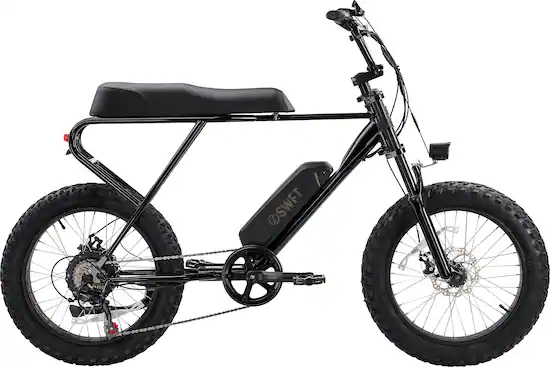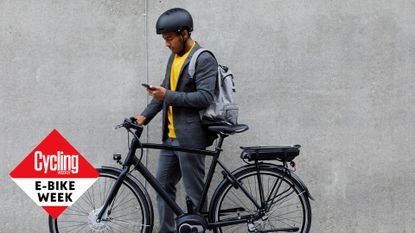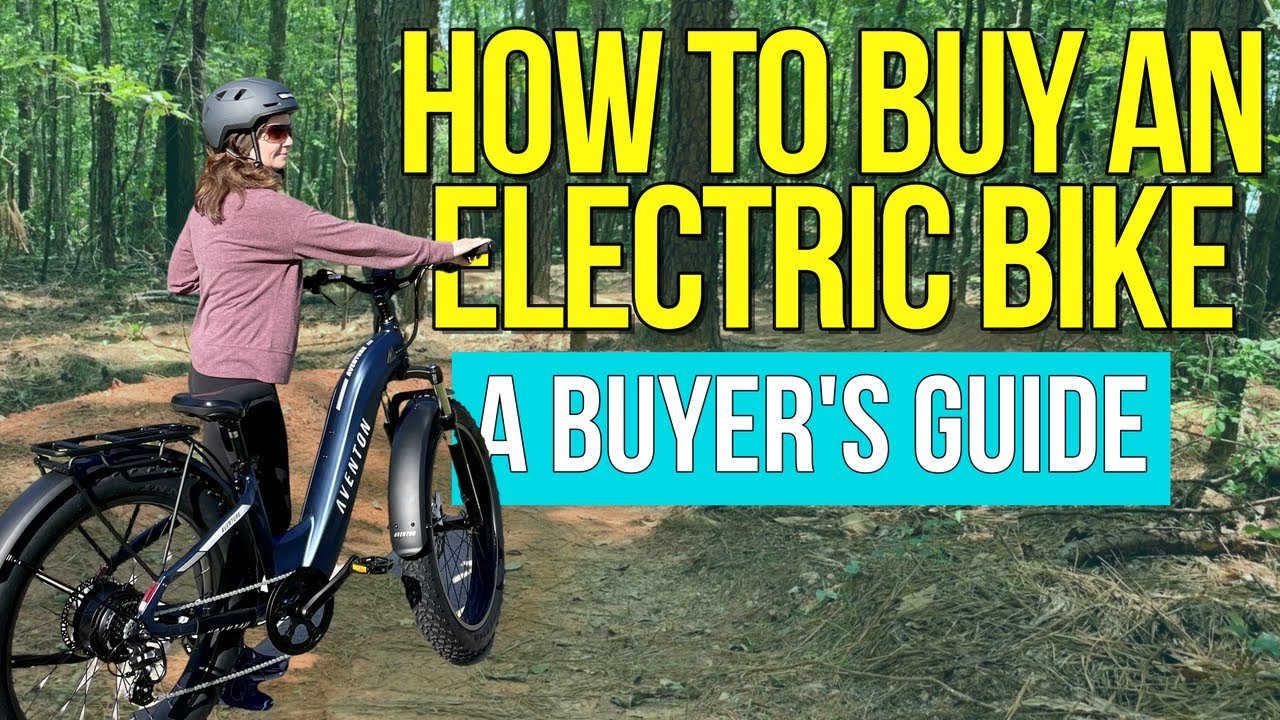To buy an electric bike, research models that suit your needs and set a budget. Test ride options to ensure comfort and performance.
Electric bikes are an excellent choice for eco-friendly transportation and effortless commuting. They offer a sustainable alternative to traditional vehicles, reducing carbon footprints. Start by identifying the type of electric bike that fits your lifestyle, whether it’s for city commuting, mountain biking, or leisurely rides.
Establish a clear budget to narrow down your choices. Research different brands and read customer reviews to gauge reliability. Visit local bike shops to test ride various models and ask for expert advice. Ensure the bike’s battery life and range meet your daily travel requirements. Buying an electric bike can revolutionize your daily commute and outdoor adventures.

Credit: www.bestbuy.com
Choosing The Right Type
Choosing the right type of electric bike is crucial. This ensures you get the best riding experience. Different types of e-bikes serve different purposes. Let’s explore the various options available to help you make an informed decision.
Mountain Vs. Road
Mountain bikes are designed for off-road adventures. They have sturdy frames and wide tires. These bikes handle rough terrains and steep hills easily. If you love trails and nature, a mountain e-bike is a great choice.
Road bikes are built for smooth surfaces. They are lightweight and have narrow tires. These bikes offer speed and efficiency on city streets. If your focus is on commuting or long-distance rides, opt for a road e-bike.
| Feature | Mountain E-bike | Road E-bike |
|---|---|---|
| Terrain | Rough trails | Smooth roads |
| Frame | Sturdy and robust | Lightweight and sleek |
| Tires | Wide | Narrow |
Commuter Options
Commuter e-bikes are perfect for daily travel. They combine comfort and efficiency. These bikes often come with features like racks and fenders. This makes them ideal for carrying bags and staying clean.
Consider a foldable e-bike if storage is an issue. These bikes are compact and easy to store. They fit in small apartments and car trunks. Perfect for those who need flexibility and space-saving solutions.
- Comfortable seats
- Integrated lights
- Adjustable handlebars
These features make commuting easy and enjoyable. Choose the one that fits your lifestyle and needs.
Understanding Battery Life
Buying an electric bike can be exciting. One key factor to consider is the battery life. This affects how far you can ride and how often you need to charge. Understanding battery life ensures a smooth riding experience.
Range Considerations
The range of an electric bike depends on the battery. A larger battery provides more range. Look at the battery capacity, measured in watt-hours (Wh). A higher Wh means a longer ride before needing a charge.
Here’s a simple table to help you understand battery range:
| Battery Capacity (Wh) | Approximate Range (Miles) |
|---|---|
| 300 Wh | 20-35 miles |
| 400 Wh | 30-50 miles |
| 500 Wh | 40-70 miles |
Remember, riding conditions affect range. Hills, speed, and rider weight can change the actual range.
Charging Time
Charging time is another important factor. It determines how long your bike will be out of service. Charging times vary based on the battery and charger. A standard charger can take 4-6 hours to fully charge a battery. Fast chargers can reduce this time to 2-3 hours.
Here are some tips to make the most of your charging time:
- Charge the battery overnight.
- Keep a spare charger at work or school.
- Avoid depleting the battery completely before charging.
By understanding these elements, you can make an informed decision. Happy riding!
Motor Power And Performance
Understanding the motor power and performance of an electric bike is crucial. The motor is the heart of the bike. It determines speed and efficiency. Let’s dive into the key aspects.
Wattage Explained
The wattage of an electric bike’s motor is essential. It measures the motor’s power output. Common wattages are 250W, 500W, and 750W.
- 250W: Suitable for flat terrains and city rides.
- 500W: Good for moderate hills and longer rides.
- 750W: Ideal for steep hills and off-road adventures.
Higher wattage means more power. But it also drains the battery faster. Choose a wattage based on your riding needs.
Speed Capabilities
The motor’s power affects the bike’s speed capabilities. Most electric bikes have a maximum speed limit.
| Motor Power | Max Speed |
|---|---|
| 250W | 15-20 mph |
| 500W | 20-25 mph |
| 750W | 25-28 mph |
Remember, higher speeds can mean shorter battery life. Always check the local speed regulations. Some places have specific limits for electric bikes.
In summary, understand the motor’s wattage and speed. Choose according to your needs. This ensures a satisfying and efficient ride.

Credit: www.cyclingweekly.com
Frame And Build Quality
The frame and build quality of an electric bike play a vital role in its performance and longevity. A well-constructed frame ensures a smooth and safe ride. Let’s dive into the key factors you should consider.
Material Choices
Electric bike frames come in various materials. Each material has its own benefits. Here are the most common options:
- Aluminum: Light and strong, but not very flexible.
- Carbon Fiber: Very light and strong, but expensive.
- Steel: Strong and flexible, but heavier.
- Titanium: Very strong and light, but very costly.
Choosing the right material affects the bike’s weight, durability, and cost.
Weight Factors
The weight of an electric bike influences its speed and handling. A lighter bike is easier to ride uphill. A heavier bike may offer more stability.
| Material | Weight | Pros | Cons |
|---|---|---|---|
| Aluminum | Light | Strong, Affordable | Less Flexible |
| Carbon Fiber | Very Light | Very Strong, High Performance | Very Expensive |
| Steel | Heavy | Durable, Flexible | Heavier |
| Titanium | Light | Extremely Strong, Lightweight | Extremely Expensive |
Consider both your riding style and budget when selecting the frame material. A well-balanced choice will enhance your overall biking experience.
Essential Features
Buying an electric bike is an exciting adventure. But before you dive in, it’s important to know the essential features. These features ensure you get the best performance, safety, and comfort. Let’s explore the key aspects to consider.
Braking Systems
Brakes are crucial for safety. There are different types of braking systems in electric bikes. Here are the most common ones:
| Braking System | Description |
|---|---|
| Disc Brakes | Offer strong stopping power. Work well in wet conditions. |
| Rim Brakes | Lightweight and easy to maintain. Less effective in the rain. |
| Regenerative Brakes | Convert kinetic energy into battery power. Help extend battery life. |
Choose a braking system that matches your riding needs. For example, if you ride in wet conditions, disc brakes are a good choice.
Suspension Types
Suspension helps smooth out your ride. It absorbs shocks from bumps and rough terrain. Here are the main types of suspension:
- Front Suspension: Also known as fork suspension. Found on the front wheel. It provides comfort on uneven roads.
- Full Suspension: Includes both front and rear suspension. Best for off-road and rugged trails. Offers maximum comfort and control.
- No Suspension: Some bikes have no suspension. These are lighter and more efficient on smooth city roads.
Consider your riding environment. If you ride on smooth roads, a bike with no suspension might be best. For rough trails, opt for full suspension.
Cost And Budgeting
Buying an electric bike is a big decision. Understanding the cost and budgeting is key. Electric bikes come in various price ranges. This section will guide you through the costs. We will also discuss financing options available for you.
Price Ranges
Electric bikes have a wide range of prices. Here is a breakdown:
| Price Range | Features |
|---|---|
| $500 – $1,000 | Basic models, limited features, short battery life |
| $1,000 – $2,000 | Mid-range models, good features, moderate battery life |
| $2,000 – $5,000 | High-end models, advanced features, long battery life |
| $5,000 and above | Premium models, top features, best battery life |
Financing Options
Electric bikes can be expensive. Here are some financing options:
- Installment Plans: Many stores offer monthly payments. This helps spread the cost over time.
- Credit Cards: Use a credit card with a low interest rate. Pay off the balance to avoid high interest.
- Personal Loans: Banks offer personal loans for big purchases. Compare rates before choosing a loan.
- Bike-Specific Financing: Some companies offer special financing for bikes. Check with your bike dealer.
Choose a financing option that fits your budget. Always read the terms and conditions carefully.
Test Riding Tips
Test riding an electric bike is crucial before making a purchase. It helps you understand the bike’s performance and comfort. Here are some tips to make your test ride effective.
What To Look For
During your test ride, pay attention to these key aspects:
- Comfort: Ensure the seat and handlebars feel right for you.
- Handling: Check how the bike maneuvers around turns.
- Braking: Test the brakes for quick and smooth stopping.
- Motor Power: Feel the motor’s power and acceleration.
- Battery Life: Confirm the battery lasts as long as you need.
Where To Test Ride
Choosing the right place to test ride is essential. Here are some suggestions:
- Local Bike Shops: They often have a variety of models to try.
- Electric Bike Dealers: Specialized dealers provide expert advice.
- Community Events: Look for e-bike demo days in your area.
- Friends or Family: Borrow an e-bike from someone you know.
| Aspect | What to Check |
|---|---|
| Comfort | Seat and handlebars |
| Handling | Turns and maneuvers |
| Braking | Quick and smooth stopping |
| Motor Power | Acceleration and power |
| Battery Life | Duration of charge |
Remember, every test ride is unique. Pay close attention to your comfort and the bike’s performance. Happy riding!
Maintenance And Care
Proper maintenance and care keep your electric bike running smoothly. Regular check-ups ensure your bike stays in top condition. Follow these tips to extend the lifespan of your electric bike.
Routine Check-ups
Perform routine check-ups to maintain your electric bike’s health. Check the tires, brakes, and chain regularly. Ensure the tires are inflated properly.
- Inspect the brakes for wear.
- Lubricate the chain to prevent rust.
- Check the lights and reflectors.
Routine check-ups prevent major issues. They help your bike run smoothly and safely.
Battery Maintenance
Battery maintenance is crucial for your electric bike. Keep your battery charged to prolong its life. Avoid letting it drop below 20% charge.
- Store the battery in a cool, dry place.
- Charge the battery after each ride.
- Inspect the battery for any damage.
Proper care extends your battery’s lifespan. It ensures your bike stays ready to ride.
| Component | Maintenance Tips |
|---|---|
| Tires | Check pressure, look for wear and tear |
| Brakes | Inspect pads, ensure proper function |
| Chain | Lubricate, check for rust |
| Battery | Keep charged, store properly |
:max_bytes(150000):strip_icc()/should-i-buy-electric-bicycle-everything-you-need-to-know-primer-faq_color-a0ed8ab6ba9d4e8bbf0b949127f46114.png)
Credit: www.treehugger.com
Frequently Asked Questions
What Should I Consider When Buying An Electric Bike?
When buying an electric bike, consider battery life, motor power, and bike weight. Check the range, charging time, and overall build quality. Also, test ride different models to find the best fit for your needs.
How Long Do Electric Bike Batteries Last?
Electric bike batteries typically last between 3 to 5 years. Battery lifespan depends on usage, maintenance, and storage conditions. Proper care can extend battery life, ensuring better performance over time.
Are Electric Bikes Suitable For Commuting?
Yes, electric bikes are ideal for commuting. They offer assisted pedaling, making longer commutes easier. With less effort, you’ll arrive at work fresh and on time. Plus, they are eco-friendly and cost-effective.
How Fast Can Electric Bikes Go?
Electric bikes generally reach speeds of 20 to 28 mph. Speed depends on the motor power and local regulations. Always check your local laws regarding electric bike speed limits.
Conclusion
Choosing the right electric bike involves careful consideration of your needs and budget. Prioritize battery life, motor power, and comfort. Test ride different models and read reviews. With the right research, you can find the perfect electric bike to enhance your daily commute or weekend adventures.
Enjoy the ride!


